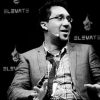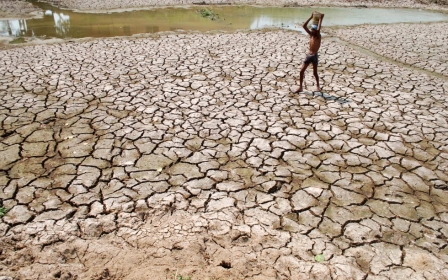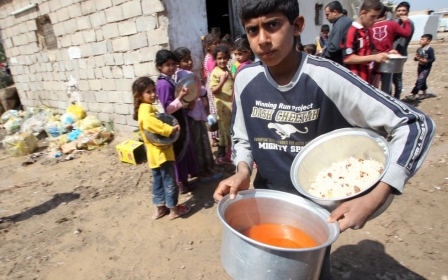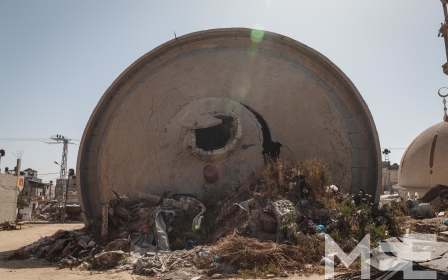Is the next threat too many 'them' in a resource-scarce future?
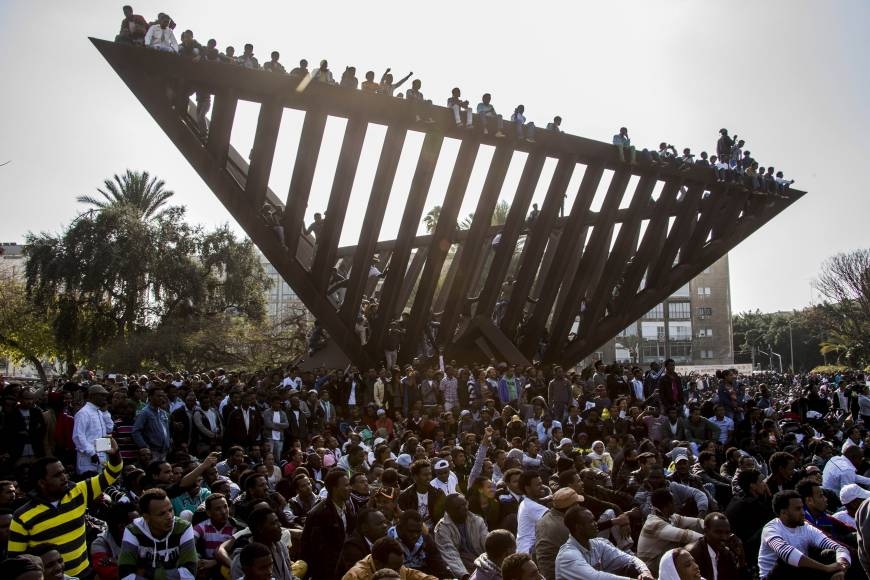
Last week, Israel hosted the 15th Annual Herzliya Conference, run by the Institute for Policy and Strategy (IPS), a hawkish think tank specialising in national security.
The conference brought together senior political, corporate, industry and military-intelligence officials from across Western Europe and, of course, within Israel, to discuss the biggest threats to Western and Israeli interests related to Middle East turmoil.
American delegates and speakers included US Secretary of State John Kerry; Tony Blinken, US Deputy Secretary of State; Amos Hochstein, US State Department Special Envoy for International Energy Affairs; Stephen Krasner, former US State Department director of policy planning under Bush; Robert Hutchins, former director of the US National Intelligence Council.
Also present were senior European and other leaders, including Nicolas Sarkozy, former president of France; Bilahari Kausikan, ambassador-at-large and former permanent secretary at Singapore’s Ministry of Foreign Affairs; Daniel Kurtzer, former US ambassador to Israel and Egypt; Lubomir Zaoralek, Foreign Minister of the Czech Republic; Jose Maria Asnar, former prime minister of Spain and a News Corporation board director.
Then there were miscellaneous players from a range of industries: Francois Henrot, vice chairman, Rothschild Bank; Rick Kaplan, head of IBM in Israel; Yossi Matias, vice president of engineering at Google; John Hofmeister, former president of Shell; Peter Clark, former deputy assistant commissioner, and head of the anti-terrorist branch and national coordinator of terrorist investigations for the London Metropolitan Police Service, and many more.
Senior current and former Israeli government, military and intelligence officials also participated.
The Islam threat
One panel titled, “Islam and BDS in Europe: A Strategic Threat?” listed William Shawcross, chairman of the UK’s Charity Commission, as a key participant. After news of his involvement circulated on Twitter, the commission stated that Shawcross was not in fact attending the event.
Under Shawcross’ tenure, more than a quarter of the Charity Commission’s statutory investigations that remain open since April 2012 have targeted Muslim organisations. Before Shawcross was appointed to head-up the Commission, he was a director at the neoconservative think tank, the Henry Jackson Society (HJS), in which capacity he said:
“Europe and Islam is one of the greatest, most terrifying problems of our future. I think all European countries have vastly, very quickly growing Islamic populations.”
Also slated for that particular panel was Peter Clarke, the former UK anti-terror police chief who was last year appointed by then-Tory education secretary Michael Gove to lead the investigation into “Operation Trojan Horse” - the alleged Islamist plot in Birmingham to takeover schools.
While Clarke’s report claimed to have found evidence of extremism – along with several other separate inquiries by Ofsted, Birmingham City Council and the Department of Education – a Parliamentary inquiry by the Education Select Committee, which reviewed the entire process, came to more nuanced conclusions:
“One incident apart, no evidence of extremism or radicalisation was found by any of the inquiries in any of the schools involved. Neither was there any evidence of a sustained plot, nor of significant problems in other parts of the country.”
The title of this particular panel, of course, raises disturbing questions. Why would “Islam,” an entire faith encompassing two billion human beings from vastly different national and cultural contexts, be depicted wholesale as “a strategic threat”?
Why would “Islam” and the international campaign for Boycott Disinvestment Sanctions (BDS) against Israel due to its ongoing illegal occupation of the Palestinian territories be equated together as “a strategic threat” – especially given that Islam and BDS are two distinct things?
In his own speech at the conference, former defence minister Ehud Barak highlighted Israel’s growing fears of the BDS movement, and its apparent alliance with Shia Islam:
“The Prime Minister is quoted as saying in recent days that no matter what we do, the battle against Israel is not connected to our actions, but to our very existence. This is true. It’s true of the hardcore at the centre of BDS. It is true of the Ayatollah, Nasrallah and Hamas… The hardcore of BDS we should have fought with all the strength and the tools five years ago, but our main task today is to create a wedge between hundreds of millions of citizens and the leadership of the free world and the core of the BDS and on that matter there is much that we can do.”
Two-states, one occupied
Notably, Barak urged Israel to accept the need for a two-state solution, a matter that Netanyahu also apparently conceded at the conference despite having rejected this as part of his own political campaign just a few months ago.
This seemingly positive concession is difficult to take seriously, given its condition: a completely de-militarised Palestine state.
Documents from past negotiations reveal what “de-militarised” actually means for Netanyahu and the Israeli right: Israeli negotiators have previously used “de-militarisation” to demand Palestinian acceptance of continued Israeli control of Palestinian airspace, an ongoing Israeli army presence in the West Bank, the right to unilaterally deploy Israeli troops into Palestine in the event of an “emergency,” and the power to dictate what, if any, weapons could be used by the security forces of the proposed “sovereign” Palestinian government.
In other words, the “state” Palestinians are being expected to gratefully agree to is not even “sovereign,” but simply a re-configuration of Israel’s occupation under a novel framework of legal colonialism.
More revealing were statements of other officials in the Netanyahu administration on this issue, that went unreported. Tzipi Hotovely, Netanyahu’s deputy foreign minister, for instance, dismissed the idea of two states:
“There is a vision that there should be a separation between the two peoples for coexistence. When that didn’t succeed, they promised us that the aim of this separation would be an umbrella of legitimisation. Then they said the partition and separation would be something that could get us by with the other nations. Now, in 2015 an entire generation asked and demanded peace and what did it get? Delegitimisation… The problem is not one state but the idea of two states, and our thoughts have been frozen on this issue.”
Energy crisis
The obsession with maintaining control of Palestine, even if granted a so-called “state,” is not just motivated by ideological or religious concerns.
One panel title at Herzliya, “Israel's Domestic Gas Supply Crisis” is notable precisely for acknowledging that Israel does, in fact, face a “domestic gas supply crisis” for all manner of regulatory, bureaucratic, economic and geological reasons, in spite of having made vast off-shore discoveries.
In an interview a week earlier, former Shell executive John Hofmeister explained what he intended to talk about at the conference: “For the sake of Israel’s security, it should keep the natural gas it has found in the country, and convert everything it can to operate on gas.” He added a warning about BDS: “Israel has many enemies and no oil. What will happen if an embargo is imposed on it? If you think someone will come to the rescue, think again.”
Linked to this, as I’ve reported extensively, is Israel’s longstanding interest in exploiting Gaza’s offshore gas reserves as a “cheap stop gap” (in the words of internal British Foreign Office documents), while attempting to bring Israel’s domestic resources online – all as part of a wider Mediterranean gas export architecture dominated by US allies, Israel, Cyprus and Egypt.
Naturally, in this context, there is the need to attract foreign investment, especially from Israel’s benefactors in the US and Europe. Hence the title of another panel called, “Israel – The New Target for the World's Largest Corporations?”
But there is a wider context to these concerns that is often ignored, hinted at by this panel title: “Israel & The Global Markets 2: Energy, Food and Water Resources - Israeli Opportunities and Challenges.”
There has been no reporting on what was discussed at that panel. But Israeli defence thinking on the nexus of energy, water and food crises in the Middle East, and their impact on national security, can be discerned elsewhere.
Arab deluge
A glimpse of that thinking can be seen outside the conference in recent forecasts for the region’s environmental crises put forward by Prof Arnon Soffer, a geostrategist at the University of Haifa and longtime advisor to the Israeli Defence Force, the Israeli Foreign Ministry, the Israeli Energy and Water Ministry, the Interior Ministry, among others.
Until recently, Soffer taught at the Israeli Army Command and Staff College, and though retired now exclusively teaches Israeli security officials at Haifa University from the National Defence College, Tactical Command College, the Havatzalot Programme of the Intelligence Corps, and the trainee course of the Israeli police.
This February, Prof Soffer told Haaretz that he believed climate change would create fertile ground for the rise of Islamist extremists in the region. Groups like “Islamic State” (IS), he said, were exploiting the confluence of essentially two key factors: escalating resource scarcity due to climate change, and rapidly growing Muslim populations.
“The Middle East, says the professor, who among other things advises the Israel Defence Forces and government on demographics, is already reeling from the double whammy of climate change and growing populations. These factors are combining and are already exacerbating the struggle over resources – water, food and energy.”
For Soffer, “demographically speaking, what has been happening in the Middle East has no precedent”. He points to the quadrupling of the population of Egypt since 1958 as an example.
Necessary chaos
The current rapid destabilisation of the region, explained Soffer, is therefore not just about extremism, but about the inability of increasingly scarce resources to cater for growing populations. At the moment, though, this is good for Israel.
Indeed, as Ian Black reported for The Guardian from the Herzliya conference, multiple Israeli officials openly gloated in several discussions at the event about the strategic boon to Israel from the spiralling destabilisation of the Middle East that has ensued due to this predicament.
According to Black, senior Israeli officials told conference delegates that the civil wars in Syria and Iraq, the rise of IS, the collapse of Libya, turmoil in Yemen, the consolidation of Abdel Fattah al-Sisi in Egypt, have all have granted Israel an almost unassailable security position.
And their Western counterparts seemed to largely agree with this assessment.
African deluge
Many of the strategic issues explored at the conference have been prominent for some time among Western and Israeli defence planners, but in a largely regressive context.
For instance, among the populations that Israeli army advisor Arnon Soffer thinks will besiege Israel in coming decades in such circumstances of Middle East instability, driven by climate meltdown, are Africans.
In his 2012 report to Israel’s Environmental Protection Ministry, he argued that Israel’s proximity to Africa would make it a favoured destination for African refugees fleeing the impacts of droughts and floods.
To defend itself from this “human deluge,” he recommended that Israel build “sea fences” along its borders.
Palestinian deluge
Soffer has also for the last few decades claimed consistently that internally, Israel faces imminent demographic disaster due to the birthrate of the Arab population, although he keeps being proven wrong. That hasn’t stopped him from, effectively, rationalising genocide.
In 2004, he warned that once Gaza’s population reached 2.5 million “those people will become even bigger animals than they are today, with the aid of an insane fundamentalist Islam.” Soffer’s forecast was that Israel would have to “kill and kill and kill. All day, every day,” just to survive.
Given his role in educating Israel’s security elite, this does not bode well. It does, perhaps, give some insight into the sort of xenophobic anxieties behind Netanyahu’s “occupation through demilitarisation” vision of two “states”.
Too many ‘Them’
Lest one assumes that this sort of xenophobia is unique to the Israeli right, it is worth remembering that the fear of too many Muslims, too many black people, and too many immigrants, can also be found buried in US and British official defence planning documents.
A Ministry of Defence (MoD) report on global strategic trends published in 2010 and updated in 2013, like the Israeli army, recognises escalating risks from “a changing climate, rapid population growth, resource scarcity, resurgence in ideology, and shifts in global power from West to East”.
In that context, it says, rising Muslim populations “especially in the Middle East, Central Asia and sub-Saharan Africa” may “fuel instability” by generating “youth bulges” that could “provide a reservoir of disaffected young people” who are “susceptible to radicalisation”.
Meanwhile, the MoD report warns, “diaspora communities” in the West – a polite euphemism for black and ethnic minority groups – will be particularly vulnerable to becoming “reservoirs for resentment” and may even “act as proxies for other states” – like those in Muslim-majority regions. So the diaspora might become a fifth column. Watch out.
The language is careful, but the implications are unmistakable: in coming decades, as environmental crises and resources shortages intensify, potential terrorists are most likely to be found amongst the rapidly growing populations of disenfranchised Muslims, immigrants, foreigners and ethnic minorities. Similar assessments can be found in US defence documents.
Ostriches
The uncanny alignment here between the bigoted rhetoric of far-right extremists, and the calculated strategic planning of the Western and Israel security elite, speaks to a fundamental problem: the extremism of the far-right is being fuelled by the paranoia of an interlocking security elite.
Their ideologically driven response to global systemic crises springs from the same false, narcissistic diagnosis: this system is pretty much the best there is; there’s no alternative, and therefore, we must maintain business-as-usual (and concomitantly, our privilege) as long as possible, while fending off “threats” to the system from those who fail to understand this. It so happens that those who fail to understand this comprise most of the world’s population.
- Nafeez Ahmed PhD is an investigative journalist, international security scholar and bestselling author who tracks what he calls the 'crisis of civilization.' He is a winner of the Project Censored Award for Outstanding Investigative Journalism for his Guardian reporting on the intersection of global ecological, energy and economic crises with regional geopolitics and conflicts. He has also written for The Independent, Sydney Morning Herald, The Age, The Scotsman, Foreign Policy, The Atlantic, Quartz, Prospect, New Statesman, Le Monde diplomatique, New Internationalist. His work on the root causes and covert operations linked to international terrorism officially contributed to the 9/11 Commission and the 7/7 Coroner’s Inquest.
The views expressed in this article belong to the author and do not necessarily reflect the editorial policy of Middle East Eye.
Photo: African asylum seekers who entered Israel illegally via Egypt stage a protest in Tel Aviv on Sunday, slamming the Jewish state's long-term detention of illegal immigrants, January 2014. (AFP)
Stay informed with MEE's newsletters
Sign up to get the latest alerts, insights and analysis, starting with Turkey Unpacked
Middle East Eye delivers independent and unrivalled coverage and analysis of the Middle East, North Africa and beyond. To learn more about republishing this content and the associated fees, please fill out this form. More about MEE can be found here.


